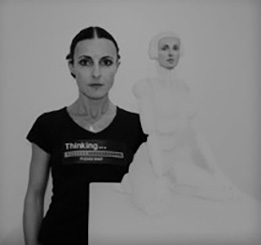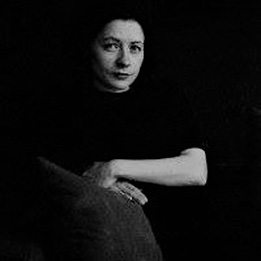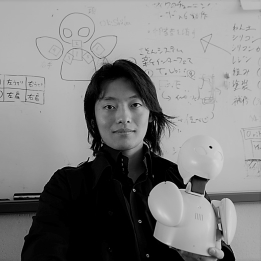Workshop Ecotic 2022・speakers
Thursday June 2nd 2022 @ French Embassy in Tokyo & online
For the third edition of this workshop we have invited again a unique panel of speakers to discuss the topics of ecotic.
 |
France CADET is a French digital and robotics artist whose work ironically raises questions about various aspects in science debates and contemporary anxieties about biotechnology, exploring the complex relationship between humans and animals, between humans and androids, while blurring boundaries between natural and artificial. She is the head of the robotics lab at the Ecole Supérieure d’Art d’Aix-en-Provence, and was a professor at the renowned School of the Art Institute of Chicago. In addition, she has been giving robot-like training workshops for several years. She came from a background in science before turning to artistic studies. Known by her robotic and bio-oriented multi-media installations which combine these two interests, she has done solo and group exhibitions nationally and internationally. She received the 1st Prize of VIDA 6.0, an Art & Artificial Life International competition in Madrid, and was mentioned by the Digital Stadium Awards in Tokyo. Her work was also purchased by the Museum of Contemporary Art, the MEIAC in Spain. Most of France Cadet’s artworks tackle serious problems but in an ironic and ludic way: funny toys, pleasant games, charming pets, cute robots… In a large part of her work she uses a commercial robotic dog on which she performed surgery, customized their forms, and reprogrammed them with unusual behaviours. These new strange creatures allow her to embody questions concerning contemporary anxieties about biotechnology, animals rights, dangers of cloning, eugenics, and to make a critical social comment about ethical questions and possible consequences of a technologically driven future, through ironical caricaturization but which is based on very-real facts. |
 |
Marion LAVAL-JEANTET is a French artist, transcultural psychiatrist, and Professor at University Paris 1 (Panthéon-Sorbonne), she leads the program Art Mondiality and Environment (UMR Acte – CNRS), and holds postgraduate degrees in Art (University Paris 1), Biology, Anthropology and Clinical Psychology (University Paris 8 and 10). She has exhibited her artistic work with Benoit Mangin since 1991 under the pseudonym AOO (Art Object Oriented), while continuing research work in aesthetics, bio-anthropology and transcultural psychiatry (she has been initiated to different shamanistic rituals). |
 |
Muriel JOLIVET is a professor at Sophia University in Tokyo, where she has lived for over 40 years. She is the author of numerous books on Japanese society (Japan: The Childless Society? The crisis of motherhood, Homo japonicus, Japon: le crise des modèles, Tokyo memories, Tokyo instantanés, Confidences du Japon, etc.), some of which have also been translated into Japanese. Her work focuses on a comparison of different societal trends observed in Japan and in the West. Her research has a strong focus on the position of women in the Japanese society, and more recently on women shaman in Japan. In 2004, she was made knight of the National Order of Merit. |
 |
Agnes GIARD is an anthropologist, working on the industry of human affective surrogates (low/middle/high-tech) in the context of Japanese national depopulation. Her research tackles the consumption of emotional commodities – such as digital boyfriends or holographic spouses – and the stigma attached to o-hitori-sama, single people held responsible for the falling birthrate. Her last book – Un Désir d’Humain – received a distinction from the ICAS Book Prize: it was selected as one of the “5 best books published in France in the field of Asian Studies” in 2017. This book relates to “artificial life” systems, i.e. love dolls, framed into a symbolic system dealing with failure, lack and loss. She currently works as a Postdoctoral researcher belonging to EMTECH (Emotional Machines: The Technological Transformation of Intimacy in Japan), a scientific project funded by the European Research Council and hosted by Freie Universität Berlin. She is also Associate Researcher in Cultural Anthropology at the Sophiapol laboratory (EA 3932), University of Paris Nanterre. She published 5 books dealing with gender, sexuality and love in contemporary Japan (out of which 3 have been translated in Japanese). |
 |
Jérôme MONCEAUX is recognized as a world expert in interactive and social autonomous robots. As one of the main actors in the Aldebaran-robotics success (Nao, Pepper and Romeo), he occupied Executive positions for 10 years. In 2015, he founded Spoon, a company that creates interactive characters called Spoonies. These digital characters accompany us in our different living spaces, whether they be cultural spaces, the city, but also cars or phones and that they bring service and magic to our everyday life. Recently, he founded Enchanted Tools that aims to enchant the world by bringing an artistic dimension to induce a feeling of marvel into technological innovation. This alliance between usefulness and marvel is at the heart of its vision, so Enchanted Tools has taken the ambitious challenge of delivering a first prototype of a humanoid robot by the end of 2022. |
 |
Kentaro YOSHIFUJI participated, while in highschool, in the invention of an equalization mechanism for electric wheelchairs, winning the Ministry of Educations, Culture, Sports, Science and Technology Award in 2004 at the High School Science and Technology Challenge (JSEC). The next year he represented Japan in the International Intel International Student Science and Technology Fair (ISEF) held in the United States where he got 3rd place. After studying artificial intelligence at a college of technology, he went to Waseda University School of Science and Engineering. Based on his own true experiences, he developed the notion of “OriHime”, an avatar communication robot to combat loneliness (in 2012 he was awarded the “Human Power Award” for this achievement). This lead to establishment of Ory Laboratory Co., Ltd. a company that aims to decimate the avatar robot notion to as many people that can benefit from it as possible. According to himself his own personal mission is “I want to make it so that people are able to meet the people they want to even while staying in their sickbed, and at the same time I am aiming to create a future where everyone can participate in society, that is why I continue promoting the development of communication technology such as OriHime. By the way my hobby is Origami, the art of Japanese paper folding." |
 |
Emanuele QUINZ is an art and design historian and curator. He lives and works in Paris, where he teaches at the Université Paris 8 and the École nationale supérieure des Arts décoratifs. His research explores the border zones between different artistic disciplines, from design to architecture, from music to visual arts. He has published The Invisible Circle. Environments, Systems, Devices (Mimesis, 2014; Les presses du réel 2017), Strange Design (with J.Dautrey, éditions:It, 2014), Behavioral Objects (with S. Bianchini, Sternberg Press, 2017) and Against the Object. Conversations on design (Quodlibet, 2020). |
contact us: gvinfo@cc.tuat.ac.jp a workshop organized with the support of the French Embassy in Tokyo and Kawada Technologies
